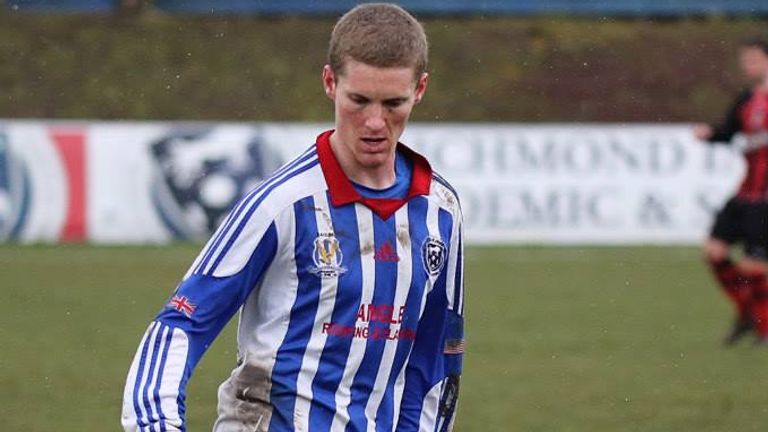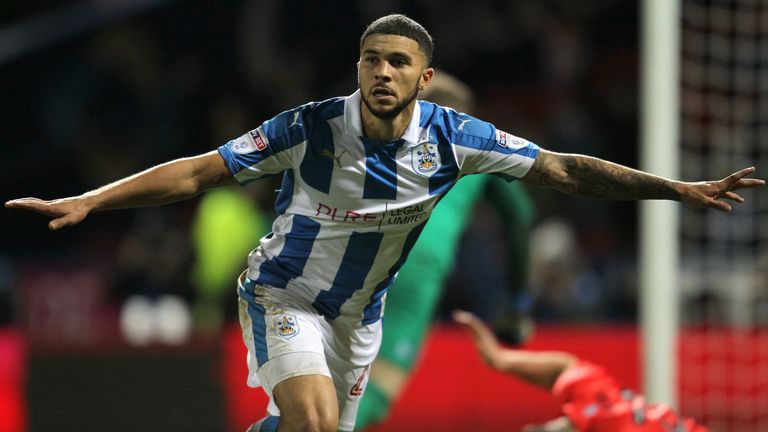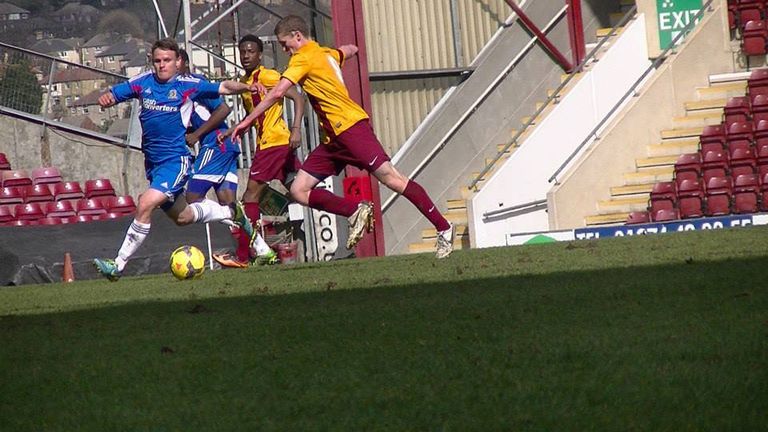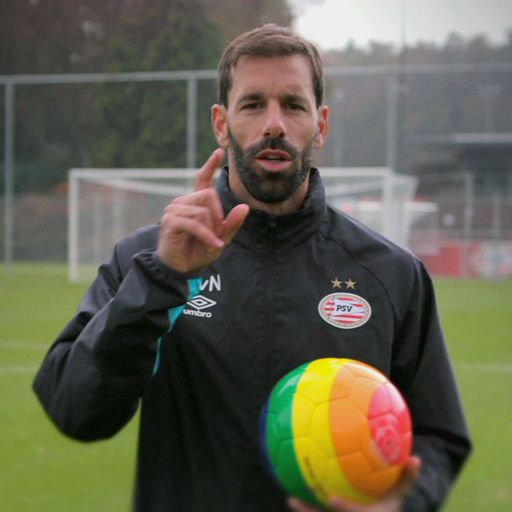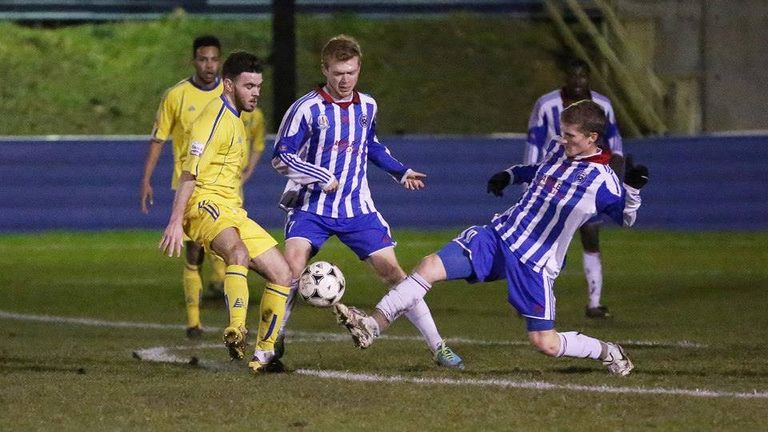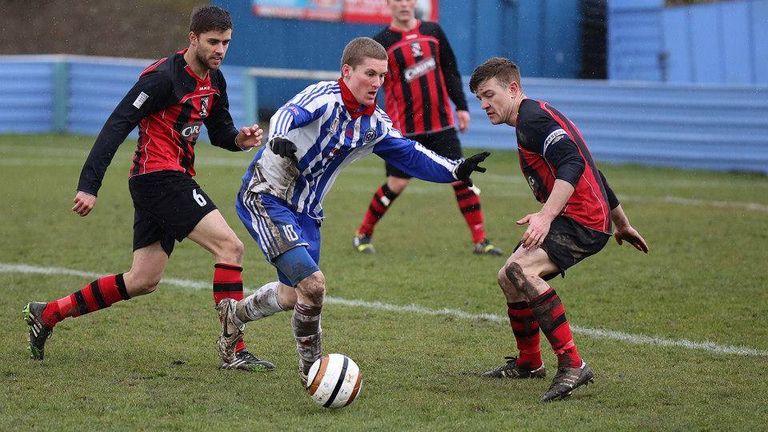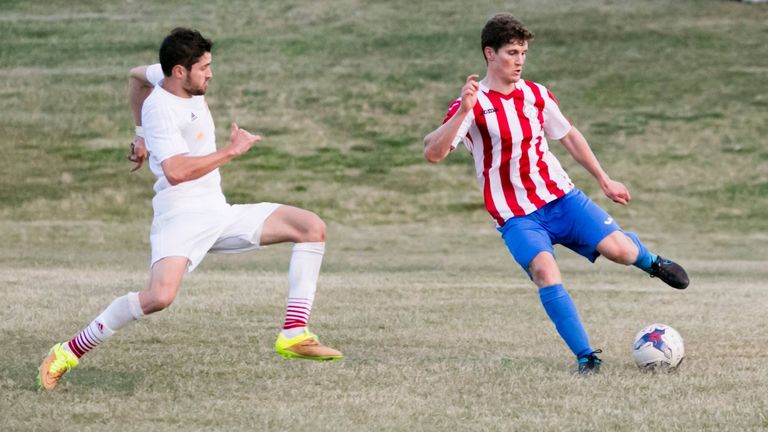A gay footballer's story: Adam McCabe on homophobia, mental health, and falling in love with soccer all over again
'There are definitely footballers who need to know that there's someone out there like them'
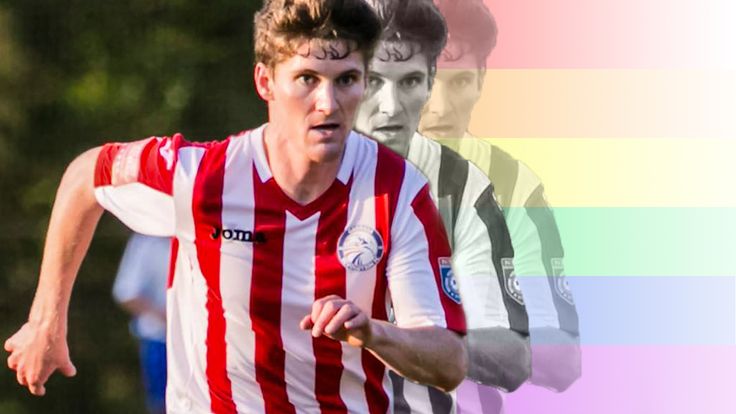
Monday 21 August 2017 16:23, UK
Adam McCabe was 23 when he headed back across the Atlantic after nearly four years of following a childhood dream - to become a professional footballer in Europe.
It was March 2015, and he faced an uncertain future. A technically accomplished defensive midfielder, McCabe had impressed through several stages of a US soccer academy programme based in West Yorkshire that included outings for Bradford City reserves, and which presented further opportunities abroad. There had even been a cup final triumph at Valley Parade, and despite setbacks with injuries and illness, he was catching the eye of scouts. But as the fight to get noticed intensified, McCabe felt increasingly trapped by a secret - his struggle to accept his sexuality.
"I was at the lowest of my lows," recalls McCabe of his decision to return to the States. "Everything was internalised for me. I had basically lost all love and passion for football. I said to myself: 'This isn't going to be right. I need to come home.'"
With clubs up and down the country supporting Football v Homophobia month in February, McCabe is keen to share his story - not just another tale of 'what might have been', but a revealing insight into the hidden crisis of confidence that can hold back talented players.
"If I had had someone to speak to, I honestly think I'd still be playing at a high level," McCabe told Sky Sports.
"That's where I'm coming from with this - if I can be that person for someone else, that'd be great. I needed that person and I didn't have it.
"There are definitely footballers who need to know that there's someone out there like them."
***
I was 13 when I first went abroad to play, a trip to Argentina with my club - we got to play against youth teams from Boca Juniors and River Plate. From that point on, I had the bug - I wanted to become a professional. Growing up in Florida, I watched the Premier League every Saturday. England is still the mecca of football, and it was my ultimate goal to play there. Steven Gerrard was my hero. In my late teens, I was part of an Olympic Development Programme - you were with the best of the best in Florida, taking on different states. I spent a year at college, but it was only a 10-week soccer season. I wanted an experience where I was playing all year round. A friend had started with the Richmond International Academic & Soccer Academy (RIASA), based in Leeds. He told me all about it, so I applied and was accepted. I was 19 when I started; it was an opportunity I couldn't pass up.
Nahki Wells was at RIASA the year before me - he's top class. Being Bermudan, he has Commonwealth citizenship so he could get picked up by a club more easily than us Americans. That's not taking away from how amazing a player he is though; he could get Huddersfield into the Premier League. He was the poster boy for the programme, which proved to be just what I was looking for. I was playing every weekend - we had tons of different teams in various leagues, and a close partnership with a local club called Eccleshill United. We also had showcase games at different academies, going to play Ajax U20s in Amsterdam and also a Real Sociedad side. By being seen in action with Eccleshill, I was able to play with Bradford City reserves at a competitive level. These were experiences I would never have had back in the US.
In my first year there, I was even asked to go to Belgium for a trial with Sporting Charleroi. They'd just been promoted to the top division. It was all tremendous and I was enjoying the experience - we were travelling a lot, I was getting my education with a business qualification and on the football side, I was living my dream. Leeds is a great city, with big sports clubs, and university life was fun - but I only really cared about soccer and school. Throughout this whole time, I tried to be so focused because there was also this other side of me where I was very anxious and nervous. I was hiding something from everyone and trying to act in a certain way.
In February of my second year, Robbie Rogers came out - it was on every news outlet and it really hit home with me. It was the first story I felt I could identify with, and made me very emotional. I knew I could be a professional footballer and also be gay, but I doubted whether I could actually be open about it. When Robbie came out, I felt I could at least take a breath. I was very fearful of what might happen if I told people my secret, because it's still very hyper-masculine around sports. I was also afraid that Robbie wouldn't come back to football; I badly wanted there to be an active, openly gay soccer player. I had hope and confidence that he would return to the game, because I had watched him growing up and I knew he was a very good player. Suddenly, here was Robbie able to be honest with everyone, and me thinking I would live this lie throughout my entire life and end up marrying a woman and have kids. I'd never thought I'd be able to be open and be my real self. But he allowed me to have that belief - he settled me.
In the locker room, there is banter - and for a closeted athlete, it can be intimidating in two different ways. One is that you can't really connect with some of the other athletes over what they're discussing. They're talking about women a lot of the time, and you've got to put on this facade of 'oh yeah, I sleep with women, I'm interested in women, when I go to the club I'm looking for this, this and this'... when in reality, you're so far removed from what they're talking about. You're trying to keep up with your own lies, thinking 'what did I say last time? Are my lies lining up OK? Am I able to fool them?' That's always on your mind. Then there are occasions when team-mates and coaches are trying to pep you up - they're talking about the other team, and there's language that goes around that can be homophobic. When people use words like 'faggot', 'poof' or 'queer', it's usually a split-second decision and they're not really thinking about what they're saying. But when you're a closeted athlete sitting there, looking at your coach saying these things, you're taken aback. I would sort of close down, I couldn't look at my coach, only at the floor... in a way, with these words, it would feel like he was directly talking about me. He wasn't - he would be talking about the other team - but you still get that sense of disappointment, that sense of 'they don't like someone who's like me'. There are so many negative connotations with those words and particularly within sport, so when you hear them being used in a pep talk or about the opposition, it can be very damaging. It makes you want to stay closeted and keep your secret even more.
With one of the teams I was with, there was a kit man among the staff who was a gay guy. Some of the things that were said about him in the locker room... that's when I really thought 'I can never come out to these people'. They were joking around, saying 'we've got to wait until this guy leaves before we can change'. And I'm thinking, 'man, what if they knew that I was gay and they're changing in front of me? Would they have that same mindset?' Again, it was just banter and they're trying to be funny, but when they're joking about someone being gay who's part of our staff at the club, and making little snide comments here and there, that was even more damaging than the homophobic language used in my coach's pep talks. I'm hearing them say stuff directly about a gay person, and I'm a gay person. It really hits home. It's important to say here, however, that I don't want to take anything away from RIASA, Eccleshill United or Bradford City - they're great programmes and establishments. Since I came out, I've had tons of former team-mates say 'if I said anything in the locker room, I'm really sorry'. I don't think they ever said things out of hatred, or even to be disrespectful.
In December of 2013, Leeds United invited Robbie Rogers back to Elland Road to be guest of honour at a game against Barnsley. I remember reading about it in the local newspaper. I had a match that day, but I thought about lying to my coach and saying that I couldn't play because of illness or injury. I badly wanted to be at that game, be in that atmosphere, and somehow reach out to Robbie... it was surreal and emotional. I remember thinking I'd get to have a conversation with him and say: 'I'm a younger version of you'. He gave me so much hope for what I wanted to do. It was eerie in a way, that we were so similar in our paths. By this time, he'd been playing again with Los Angeles Galaxy. I'd thought he needed a break. Eventually, I'd end up needing the same thing - I wasn't thinking of being in Robbie's shoes. I just knew how taxing it was trying to hide a secret like that.
I was part of a successful team at Eccleshill - and that was the main reason I was afraid to come out. In April 2014, we won the FA West Riding Cup at Valley Parade, beating other semi-professional teams in and around the county, mostly made up of players older than us who were in academies growing up and didn't quite make it. I didn't want to be the one who messed things up. In sport, it's usually the most collective team that wins - when everything's flowing, when everyone trusts each other and knows their role and responsibility on the team. Whenever there's any little kink or crack in that shield, things can start to fall apart. A gay player fears someone will think differently of him, or maybe say they don't trust him, or even 'I don't want to pass him the ball'... that's the biggest extreme, but those are the fears you have as a closeted athlete. You don't want to upset the team environment because that's how you win.
Right after we won the cup, I tore my medial cruciate ligament. Eccleshill were about to play in another tournament final - the League Cup for North-East counties - and I knew there were going to be scouts at that game from clubs we had good relationships with in Norway, Finland and Malta. But I got injured in a meaningless league game in between. It was a big chance missed, because I'd seen how difficult it was going to be with working visas and the passport issue so playing professionally in England wasn't realistic. I'd had that trial before at Charleroi and maybe the Belgian First Division was too high of a level for me. But before I tore my MCL, I think I had a good chance of playing in Scandinavia and becoming a professional. I graduated from RIASA in May and stayed around for a while for rehab, and to see what opportunities might arise. When I came back, I played a few games for Eccleshill and then decided to try my luck elsewhere. I went to Thailand, then a friend I'd played with in England who was from Bratislava suggested I trial at a Slovakian club he was at. They liked me, and wanted me to stay. We were talking about what my contract was going to be. It was the turning point - but I knew I couldn't sign for them.
In my second year at RIASA, I'd been diagnosed with ulcerative colitis - the same illness that afflicted Darren Fletcher. When I first started showing the symptoms, I had to go to hospital because I became anaemic. I was in there for a week, getting steroids pumped into my body. After that, the illness was manageable because the healthcare in England is so good - I could see a doctor pretty regularly via the club connections. I'd get the medicine I needed then, but it was much harder to obtain in places like Thailand and Slovakia, where the language barrier meant I'd struggle to explain my medical history to local doctors. But my mental health was an even bigger problem. In Slovakia, only one person I knew spoke very broken English. I was extremely lonely, and couldn't connect or talk to anyone. I found myself in my head all the time. I was 23 and had never even spoken to another gay guy, never mind kiss one. I felt like I was missing out on growing up, and asking myself 'will I ever come out? Will I ever be able to love someone?' After five years of living out of a suitcase and inside the closet, I was mentally exhausted. I lost all focus on soccer and also my love for the game. I knew I had to come back home and figure out who and what I wanted to be.
I came out to my mother first. I felt I was going to have a panic attack. We were in the car; thankfully, she was driving. I told her and she said she'd always had a suspicion but quickly added: 'I'm going to love you no matter what. You're my son and I'm so proud of you.' That was like the first wall coming down, and afterwards it didn't feel like so much of a big deal. I told my best friend and the response was the same... it becomes easier and easier after that. As for soccer, I gave it a break for a while. Then I began playing in a local league. A guy came up to me one day and said he'd just bought a team in Georgia and he wanted me to play for them. I had some reservations at first, but I wasn't playing at a decent level and I was getting very frustrated - I'm an extremely competitive person. So I joined up - the team are called Georgia Revolution, and are part of the National Premier Soccer League, the fourth tier of soccer here in the US. The season runs from March to July/August, depending on how well you do. We play up and down the South East, and the teams consist of ex-pros, those that didn't quite make it, college players... a good mix. Also, when I was over in England, I'd got my FA Level 2 coaching badge. I really enjoy coaching, and now I teach soccer at a couple of schools here in Atlanta.
I've been in a relationship for about a year and a half, and my boyfriend and I have just bought our first apartment together. I've got a full-time job, and I do some modelling work for an all-inclusive agency too. Every box feels ticked right now - my love life, my professional life, and my athletic life. I haven't told everyone I know face to face that I'm gay. With my current team-mates, I didn't have a 'coming out' meeting or anything - that's not my fashion. On social media, people can see that I'm out. I don't hide that, but I'm also not the kind of person to go up and shake the hand of my team-mate and say 'oh by the way, I'm gay.' So I'm still in the process of coming out to people personally, and I'm trying not to make it a big deal. That's the way I want it to be.
***
Hiding your emotions from friends, family and colleagues for so long means that even after coming out, it can be hard for LGBT people to talk about themselves. Adam McCabe agrees - "I'm more of a reserved person," he stresses - but with so few gay players having ever discussed their experiences in English football, he knows he is in a rare position of being able to help others. "I just want to create a platform where people can look at someone as an example," he adds. "My example was Robbie Rogers - even though he stepped away from the game for a time, his story had a big impact on me. I hope that by talking about my experiences, I can help someone who's struggling, who needs to talk to someone. As more people come out, it really does make it easier for others. And if we're all supportive of those that do, it'll make the sporting world a better place."
You can find Adam McCabe on Facebook, on Twitter @McCabenater, and on Instagram @Shakiro_850. You can also reach him on email at adam.mccabe850@gmail.com.
For more information on Football v Homophobia, visit their website.

